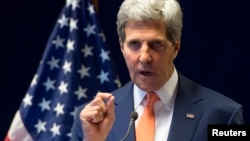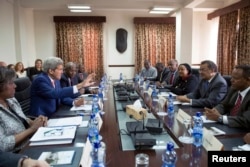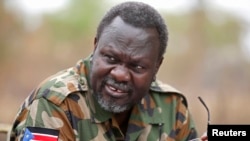ADDIS ABABA —
U.S. Secretary of State John Kerry is warning of the risk of genocide in South Sudan if four months of deadly fighting there is not stopped. Kerry on Thursday discussed the violence with regional foreign ministers and African Union officials in Addis Ababa.
Kerry says those responsible for what he calls "unspeakable violence" in South Sudan must be brought to justice to prevent the conflict from deteriorating further.
"There are very disturbing leading indicators of the kind of ethnic, tribal, targeted, nationalistic killings taking place that raise serious questions, and were they to continue in the way that they have been going could really present a very serious challenge to the international community with respect to the question of genocide," he said.
The secretary of state says he is working with regional leaders to avoid that by moving "to put people on the ground who can begin to make a difference" separating people and providing security.
He met here in Addis Ababa with foreign ministers from Ethiopia, Kenya and Uganda, who he says all agree on the need for African troops under a United Nations mandate.
He also pushed them to join U.S. moves toward a travel ban and assets freeze on those responsible for the violence but said Washington is "absolutely prepared" to move on its own.
"We may well move on our own," he said. "But each of the foreign ministers today accepted the responsibility for also doing sanctions."
Kerry says some of the violence is the responsibility of individual generals with their own agenda, "but the place to start is the place where it started," and that is with South Sudan's President Salva Kiir and his former vice president, Riek Machar.
The most serious fighting began in late December, soon after the Kiir government accused Machar of trying to seize power. While a senior State Department official says Washington does not "buy into the narrative of a coup attempt," Kerry says there is a clear distinction between the men whose "personal anger" is fueling this violence.
"The current president of South Sudan is the elected, constitutional president of a country. And Mr. Machar is a rebel who is trying to unconstitutionally take power by force. And there is a clear distinction. There is no equivalency between the two," he said.
Kerry says Machar "needs to think clearly about that," particularly in the wake of allegations that ethnic Nuer rebels killed hundreds of civilians in the town of Bentiu last month.
A U.N. report said the rebels "separated individuals of certain nationalities and ethnic groups and escorted them to safety, while the others were killed." A rebel spokesman has denied that allegation.
Kerry says those responsible for what he calls "unspeakable violence" in South Sudan must be brought to justice to prevent the conflict from deteriorating further.
"There are very disturbing leading indicators of the kind of ethnic, tribal, targeted, nationalistic killings taking place that raise serious questions, and were they to continue in the way that they have been going could really present a very serious challenge to the international community with respect to the question of genocide," he said.
The secretary of state says he is working with regional leaders to avoid that by moving "to put people on the ground who can begin to make a difference" separating people and providing security.
He met here in Addis Ababa with foreign ministers from Ethiopia, Kenya and Uganda, who he says all agree on the need for African troops under a United Nations mandate.
He also pushed them to join U.S. moves toward a travel ban and assets freeze on those responsible for the violence but said Washington is "absolutely prepared" to move on its own.
"We may well move on our own," he said. "But each of the foreign ministers today accepted the responsibility for also doing sanctions."
Kerry says some of the violence is the responsibility of individual generals with their own agenda, "but the place to start is the place where it started," and that is with South Sudan's President Salva Kiir and his former vice president, Riek Machar.
The most serious fighting began in late December, soon after the Kiir government accused Machar of trying to seize power. While a senior State Department official says Washington does not "buy into the narrative of a coup attempt," Kerry says there is a clear distinction between the men whose "personal anger" is fueling this violence.
"The current president of South Sudan is the elected, constitutional president of a country. And Mr. Machar is a rebel who is trying to unconstitutionally take power by force. And there is a clear distinction. There is no equivalency between the two," he said.
Kerry says Machar "needs to think clearly about that," particularly in the wake of allegations that ethnic Nuer rebels killed hundreds of civilians in the town of Bentiu last month.
A U.N. report said the rebels "separated individuals of certain nationalities and ethnic groups and escorted them to safety, while the others were killed." A rebel spokesman has denied that allegation.










